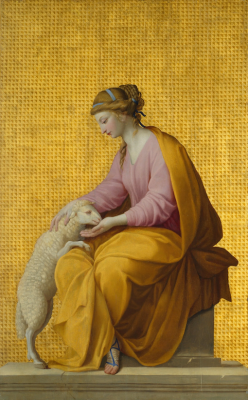Gospel in Art: Happy are you who are poor, who are hungry, who weep

Meekness, by Eustache Le Sueur, 1650 © Art Institute Chicago, Charles H and Mary FS Worcester Collection
Source: Christian Art
Gospel of 13 September 2023
Luke 6:20-26
Fixing his eyes on his disciples Jesus said:
'How happy are you who are poor: yours is the kingdom of God.
Happy you who are hungry now: you shall be satisfied.
Happy you who weep now: you shall laugh.
Happy are you when people hate you, drive you out, abuse you, denounce your name as criminal, on account of the Son of Man. Rejoice when that day comes and dance for joy, for then your reward will be great in heaven. This was the way their ancestors treated the prophets.
'But alas for you who are rich: you are having your consolation now.
Alas for you who have your fill now: you shall go hungry.
Alas for you who laugh now: you shall mourn and weep.
'Alas for you when the world speaks well of you! This was the way their ancestors treated the false prophets.'
Reflection on the painting
Luke's version of the beatitudes is counter-cultural and so we feel somewhat uncomfortable each time this Gospel reading comes up. Jesus declares 'happy' those who are poor, hungry and weep. He declares unfortunate those who are rich, who are full and who laugh. This is not the way society sees things. Indeed, the beatitudes are the very opposite of how most people in most cultures would think: success, laughter, plentitude are presented as what we should strive for in life.
Hence there is something shocking in these beatitudes and woes. Jesus is not saying that poverty is a blessing in itself. What he is saying is that the poor are blessed because God will work to transform their situation. It is often the situation of being vulnerable that creates a space for God to work. When we look back on our lives, we can see that it is often our need that opens us up to God. When we are poor, hungry and weep, those are the moments where we are most likely to experience God's nearness and God's help, as we feel a genuine dependence on him. Jesus is calling for us to always seek that dependence on him and to be open to God's transforming presence.
Eustache Le Sueur painted the eight Beatitudes, the ideal qualities Jesus identified, for the private chapel in his patron Guillaume Brissonnet's Paris home. This personification of meekness, painted in 1650, was part of that series and accompanied an altarpiece of the Annunciation. The Beatitudes, with their patterned gold ground, lined the lower band of this altarpiece. Here the personification of Meekness (one of the Beatitudes in Matthew's Gospel), appropriately accompanied by a lamb, embodies Christ's words saying in the Sermon on the Mount, "Blessed are the meek, for they shall inherit the earth."
LINKS
Gospel in Art: https://christian.art/
Today's reflection: https://christian.art/daily-gospel-reading/luke-6-20-26-2023/


















